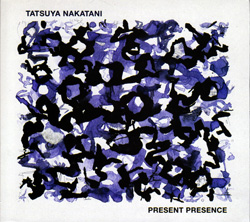
Every parent aspires to provide influence in his child's life (that can be read as "I want this kid to have my same taste so we can have at least one thing to keep us connected in the storm we call parenthood"). When my daughter was six days old — before her eyes could make out more than "the light is on, the light is off" — I put on Debussy's Nuages to gauge how much of my genes she received. She stopped wiggling and sat like a deer in the headlights with a state of shock like Munch's The Scream (minus any horror). We hopefully all have Aha! moments with art and knowledge, and I'm calling this one her first: she discovered that music exists, didn't know what to do with it, but it affected all of her.
Despite having spent many years on this planet engaged in the rigorous pursuit of music, I am fortunate to still experience versions of this phenomena, Tatsuya Nakatani's 2010 Abiogenesis being one of these. His approach to percussion is the next step in a line of unconventional masters (i.e. Tony Oxley, Eddie Prévost, Zlatko Kaucic, Lę Quan Ninh), all of which I adore and worship. In a review of that album, I called him a "musical magician who manages, caresses and sometimes hacks through his accouterment to coax new from the obvious — and, most importantly, alchemizing all potential novelty into compelling music." But just when I think I know what to expect and am ready to report out "Nakatani is still the Holy Ghost of drummers", he puts out works such as, "Present Emergence" and "Nenrin", the bookends of this album. Both begin in a lugubrious, wraithlike wave of recitation, Gyoto monk style — sans percussion; it's such a modest gesture, but one that effectively reeled me from whatever I was doing in this reality, settled me in a corner and advised that a prophet had something to say for the next 52 minutes. I'm being a bit dramatic, but that's how jaded dudes like myself react when we find a platinum nugget in the manure pile of music this world has to offer. Ahem.
Back to the opener, beneath his voice, Nakatani gradually introduces wispy, bowed prayer bowls, an intermittent thump to mark cadences and a swirling marble in a cup. It's the theme of this record: less is more, which he only occasionally challenges (i.e. "Tin Types" where Nakatani's virtuosity to work as fast and strong as hard bop jazz solos is applied to a full kit of metals). For "Sizemick" (sic), the unassuming ingredients of "a surface" and "something to rub on it" are nothing short of spectacular with myriad dynamics, textures and tones roaring through your speakers. Even the pair of "steady" works, "Uncovering Essence" and "Coastal Arc", generate interest in that 1) they pop up as a counterpoint to the non-rigid rest of the record 2) the hypnotic ostinatos (one via high pitched chimes, the other on hand drums) pull you along like strings of a puppet master. Nakatani moves to his signature bowed gong on parts ("Resonating Vehicle", "Celestial Orb"), the artist's intimate knowledge of the instrument so refined that he can lead it through exact melodies (as opposed to my abilities which yield screeching craziness).
All of this Nakatani brings together on the finale. His chant, spookier this time around, is joined with a plodding funeral march of bass drum and a variety of cymbals. As the seven-minute-plus journey concludes, Nakatani releases the listener from the spell and fades out al niente.
Pablo Picasso said, "The purpose of art is washing the dust of daily life off our souls." I can't think of a more fitting caption for Present Presence: Nakatani, dusting off your soul, one record at a time.
Comments and Feedback:
|



